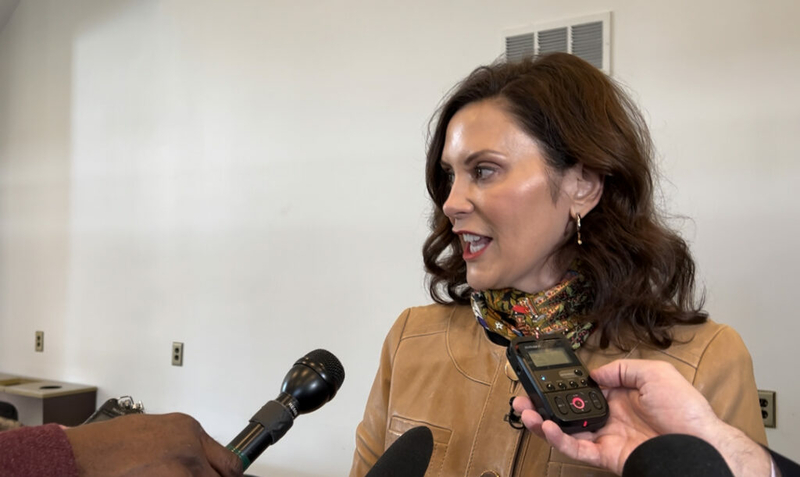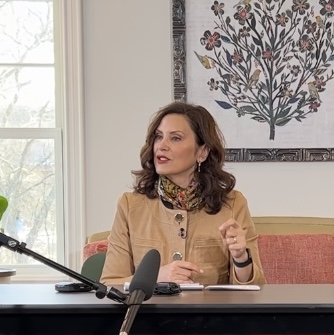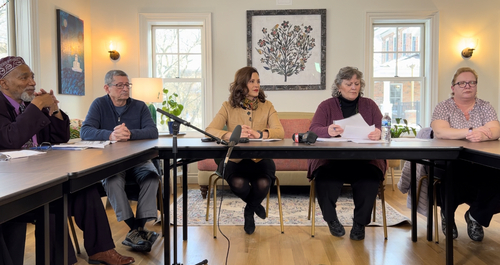Whitmer talks inflation, pension tax and education with residents before State of the State speech

On Wednesday, Gov. Gretchen Whitmer will be doing the talking when she presents her annual State of the State address to the Michigan Legislature. But on Tuesday, she mostly did the listening during a roundtable discussion in Brighton as a panel of residents, among them retired teachers and a retired police officer, discussed issues surrounding inflation, education and health care.
The roundtable, held at The Brighton Light House conference center, had seven participants and was moderated by Debbie Mikula of Howell, who serves as executive director of the Michigan Library Association.
“For those of you who have been invited today, we want to talk today about the central issues affecting our state and to share with the governor why these are important to you and to share your hopes for Michigan,” said Mikula. “We’ve come from different lifestyles, different political parties, but this is time to share privately with those flies on the wall,” she laughed as she gestured towards the gaggle of media, who easily outnumbered the participants.
For her part, Gov. Whitmer kicked off the gathering by noting that her State of the State address will acknowledge what she called the “unprecedented challenges” facing Michigan families.

“In Michigan, our top priority is supporting families,” she said. “Right now, we know that with inflation and with the pandemic, it’s been tough for a lot of people just simply to do the fundamentals, right? Put the food down on the table, to fill up the gas tank, to get the groceries.”
With that in mind, she offered up some insight into Thursday’s address.
“I’ll stay focused on people and promoting policies that will make a difference,” said the governor. “I’m going to focus on three different examples of Michiganders; the worker, people who need a little support to make ends meet. And I’m talking about the working families tax credit, which used to be called the Earned Income Tax Credit (EITC).
“It’s a way to help pull families out of poverty. A million kids live in these households that will be impacted by this policy. Half the kids in Michigan are in a household where they’ve got a full-time working parent and they just can’t get ahead.”
Whitmer added that retirees and new graduates would also be a focus for providing financial relief, whether it’s through repealing the so-called pension tax signed by Republican former Gov. Rick Snyder or helping new graduates find good-paying jobs and selecting a “path to skills that won’t put them into debt for decades.”
And with that said members of the panel dove right in, with inflation at the top of the agenda.
Shane Dennis of Howell retired last year after serving 25 years with the Ann Arbor Police Department, but has continued to work as a private security guard to supplement his pension.
“As far as inflation, gas is one of the big things for me because I have a second job,” said Dennis. “I actually commute 40 miles each direction to my job. And now that the gas is going back up again, part of my paycheck is going towards that instead of the essentials.”
But Dennis said the pension tax was also a financial strain he hadn’t necessarily anticipated.
“I mean, we all got into our line of work not to become rich, but knowing we were going to be taken care of and not have to pay (pension) taxes,” he said. “But then we get told, ‘Oh, by the way, you are going to be paying tax on your pension.’ So any little bit is going to help us, especially now with the economy the way it is and inflation.”
On that point, retired Hartland teacher Dane Morris was more direct, calling the pension tax a “bait and switch” that was just one more burden threatening the long-term viability of Michigan.
“I have three adult children, two of whom have located out of state for reasons of employment,” he said. “What can we do to keep the brain drain here in Michigan from continuing?”
Jenny Jager of Howell works as an online instructor for a trade school, and also occasionally as a substitute teacher in public schools.
“I have a 10-year-old daughter, and I’m a breast cancer survivor,” said the single mom. “The price of groceries is outrageous. A carton of eggs was $7 yesterday, and in many places it’s higher. It’s just very hard when you are used to being able to budget on a certain amount for groceries and you have to double or triple that in the month. There’s other things that we can’t do because of that.”
While there were bills last term from Democrats and Republicans addressing the EITC and pension tax, Republican leaders and Whitmer failed to reach a deal. However, with Democrats controlling the Legislature this session, there’s more optimism that an EITC increase and pension tax repeal will become reality.
When the conversation moved to education, Mikula noted a shortage of trained and qualified educators in Michigan, calling it a “big challenge and a struggle” to retain excellent teachers.
To that point, Whitmer broke in and said she wanted to highlight a few factors before hearing what the panel had to say.
“Even with a very challenging Legislature over the last four years, we were able to get a lot of good stuff done that was long overdue in education,” said Whitmer. “We closed the gap between districts. Wealthy areas traditionally got a lot more to educate kids and districts with fewer resources got less. We leveled that and then built equity on top by putting more into special needs, more into English language learners, more into kids who are at risk. We have stipends for student teachers now to try to lure people to go into the profession.”

Morris, the retired Hartland teacher, was quick to offer his take on why education positions were becoming harder to fill, saying money was not the only factor.
“I think really the thing that is driving more people out of the profession is this whole lack of respect,” he said. “It’s not even necessarily the salary. We don’t become teachers because we want to get rich. But that’s the biggest issue I see is just the lack of respect for us as professionals, and then the Republicans feel that anybody can be a teacher these days, which is the craziest damn thing that you can think of.”
Morris, who previously ran as a Democrat for the Livingston County Board of Commissioners, said the best illustration of that were the recent school board elections.
“Livingston County is a perfect example,” noted Morris. “We recently elected a lot of new school board members who are anti-school. I don’t know any other way to put it. The slates that ran out here are just not going to be supportive of public education. So I think that’s the biggest problem that we see. There are school board members who actually believe, and it just astounds me, that there are litter boxes in the bathrooms. That’s what we’re dealing with.”
Whitmer agreed and made a point to debunk a right-wing conspiracy theory circulated by podcaster Joe Rogan and Michigan GOP Co-Chair Meshawn Maddock that kids are identifying as “furries” and are using litter boxes in classrooms. This has been used to push anti-trans policies in schools.
“And there are no litter boxes,” she said. “I just wanted to say that because I think people believe that.”
Also speaking on the topic of education was Victor Gibson of Detroit, who serves as president of the Detroit Federation of Teachers Retirees Chapter 231.
Gibson said the problems facing the state’s education system were not exclusively about funding.
“Everybody don’t need to go to college,” said Gibson. “We have to quit saying ‘college, college, college’ to our children. The high school trades — everybody needs heating and cooling right now, but they’re not pushing these. I can go straight from high school and make a good living. We used to have auto factories for that, but now they are kind of modernizing all that labor out. So we have to rethink our directions and our goals.”
Whitmer thanked the group for their time and perspectives.
“The work that I do is centered around trying to make real opportunities for all people in the state and to pull more people into the state of Michigan,” she said. “And that’s why hearing your voices is so important to me. And I thank you. I hope that when you see the State of the State, or the coverage of it, you see that this conversation has informed the work that we’re doing. But also when I introduce the budget two weeks later. Like your household budgets, right? You spend money on the things that are fundamental and that are important and that’s how we write the state budget as well. So I appreciate you.”
Afterward, the governor took some questions from reporters focused on the details of how she plans to approach her second term.
When asked just how much having a Democratic majority in the Legislature will help her. Whitmer said there will certainly be a different tone, but it would still be very important that they try to find as much bipartisan common ground as possible.

“The Democrats control both the House and Senate, but only by two votes in each chamber,” she noted. “And so I’ve told everyone, ‘I don’t look at the outcome of the last election.’ It was historic, but I don’t look at it as a mandate. I look at it as affirmation that we’re focused on the right things and that’s going to drive where I spend all my energy this next term.”
When it came to her plans about altering the state’s tax structure, the governor was quick to dispute the characterization that her first budget proposal taxed Michigan businesses to pay for repealing the retirement tax.
“What I proposed was undoing the previous administration’s tax increases on individuals,” said Whitmer. “That’s what I proposed. Now, we are in a much stronger financial position as the state, and we can’t afford to give this type of tax relief without undoing all the pieces of what the previous administration had done at that time. So I know that we have made great strides, we’ve got an opportunity in front of us to give people relief and we’re going to continue to work with the Legislature to make sure that we get it done.”
When pressed on what kind of details her speech Thursday would include on proposed legislation surrounding LGBTQ+ rights and gun safety, Whitmer said while she wasn’t planning any surprises, noting those issues have always been a priority.
“I think all of my States of the State called on our state to come into this moment and give the LGBTQ community full protections under the law,” she said. “[Attorney General] Dana Nessel thankfully argued and won a case [on LGBTQ+ rights] this past summer, but we still need to codify it. And so I want to get that done. I think it’s important for our economy; it’s important for Michiganders and our future.
“And as far as some common sense gun safety, you know I talked about that all throughout the campaign. I’ve listened to Oxford families [impacted by the 2021 high school shooting]. I’ve listened to communities that suffer through too much gun violence, and we know that there’s some common sense things we can do that will make a difference. And I think we have a duty to do it.”








